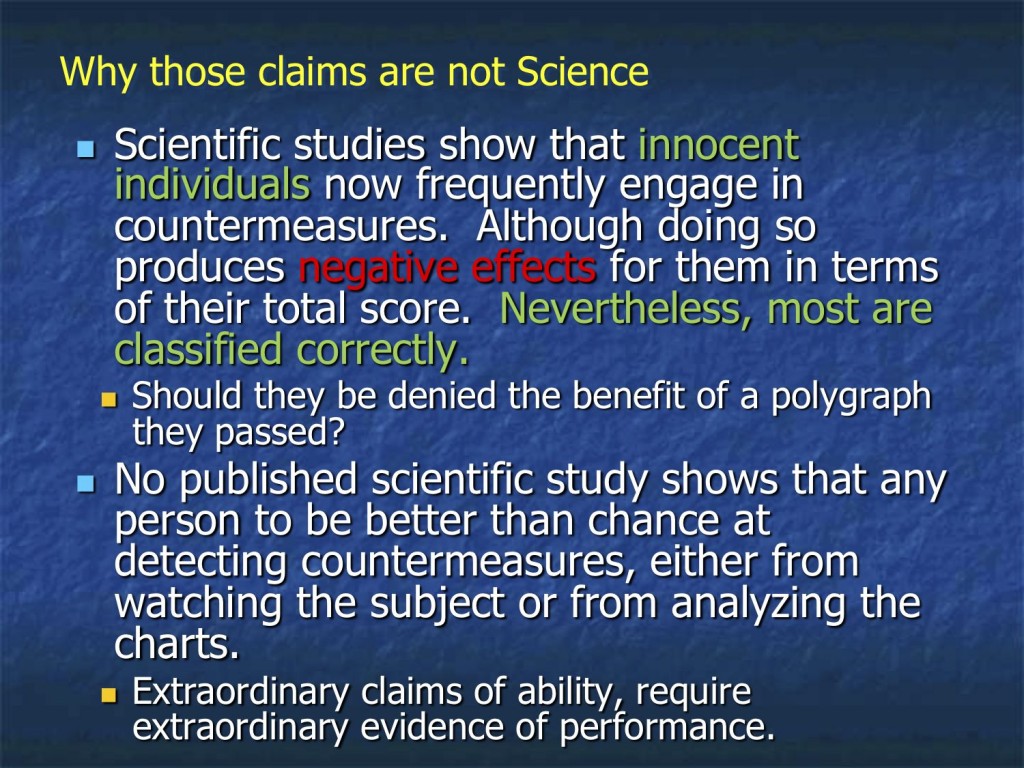On Friday, 12 April 2013, AntiPolygraph co-founder George Maschke sent an inquiry to U.S. Attorney General Eric Holder seeking clarification on whether the U.S. Department of Justice considers the learning, using, or teaching of polygraph countermeasures by or to federal employees or applicants for employment is a crime:
Date: Fri, 12 Apr 2013 12:38:55 +0000
From: maschke@antipolygraph.org
To: Attorney General Eric Holder <AskDOJ@usdoj.gov>
Cc: DHS Secretary Janet Napolitano <janet.napolitano@dhs.gov>, “DHS Acting Inspector General Charles K. Edwards” <charles.edwards@dhs.gov>, “CBP Deputy Commissioner Thomas S. Winkowski” <thomas.winkowski@dhs.gov>
Subject: Operation Lie Busters: Is Learning, Using, or Teaching Polygraph Countermeasures a Crime?
Dear Mr. Attorney General:
I’m a co-founder of AntiPolygraph.org, a non-profit, public interest website dedicated to polygraph policy reform. AntiPolygraph.org’s ultimate objective is the elimination of the exemptions to the Employee Polygraph Protection Act of 1988 that deny federal, state, and local government job applicants, employees, and contractors the protections against lie detector “testing” that other Americans have enjoyed for the past quarter century.
In 2002, the National Research Council concluded that “[polygraph testing's] accuracy in distinguishing actual or potential security violators from innocent test takers is insufficient to justify reliance on its use in employee security screening in federal agencies.” In 1997, retired FBI Supervisory Special Agent Dr. Drew Richardson, then a polygraph expert with the Bureau’s Laboratory Division, put it more directly in testimony before a Senate subcommittee: “the diagnostic value of this type of testing is no more than that of astrology or tea-leaf reading.”
Rejecting the science on polygraphy, federal agencies have actually increased their reliance on it over the past decade. Pre-employment polygraph failure rates on the order of 50% or more are the norm among federal agencies with a polygraph requirement, and given polygraphy’s lack of scientific underpinnings, it is inevitable that many honest applicants are being falsely branded as liars by their government and wrongly blacklisted from employment for which they are qualified. Those falsely accused of deception have no meaningful avenue of appeal.
Since 2000, AntiPolygraph.org has made available a free book titled The Lie Behind the Lie Detector (1 mb PDF) providing documentation on polygraph validity (or lack thereof), policy, procedure, and countermeasures. Polygraph countermeasures are techniques that can be used to pass a polygraph whether or not one is telling the truth. While deceptive individuals can use countermeasures to fool the polygraph, truthful persons may also elect to use them to mitigate the high risk of a false positive outcome. AntiPolygraph.org has no desire to help liars beat the polygraph, but we know of no way of making such information available to honest persons with a legitimate need for it without also making it available to everyone. We believe that such speech is protected by the 1st Amendment of the U.S. Constitution.
The choice of a truthful person to use polygraph countermeasures is not an irrational one. The late David T. Lykken, an eminent authority on polygraphy, opined: “…if I were somehow forced to take a polygraph test in relation to some important matter, I would certainly use these proven countermeasures rather than rely on the truth and my innocence as safeguards. An innocent suspect has nearly a 50:50 chance of failing a CQT [Control Question Test -- the technique used by federal law enforcement agencies for pre-employment screening] administered under adversarial circumstances, and those odds are considerably worse than those involved in Russian roulette.” (A Tremor in the Blood: Uses and Abuses of the Lie Detector, Plenum Trade, 1997, p. 277.)
No polygraph operator has ever demonstrated the ability to detect the kind of countermeasures we discuss in The Lie Behind the Lie Detector, and polygraph community documents recently released by AntiPolygraph.org show that the polygraph community has no coherent methodology for detecting such countermeasures.
Information has come to our attention suggesting that, unable to detect polygraph countermeasures, at least one federal agency is construing the teaching, learning, and/or use of them to be a crime, at least in some circumstances.
U.S. Customs and Border Protection (CBP) has revealed the existence of a criminal investigation called Operation Lie Busters in which 10 applicants for employment with CBP “were identified as receiving sophisticated polygraph Countermeasure training in an effort to defeat the polygraph requirement.” The CBP Public Affairs Office refused to answer any questions regarding Operation Lie Busters, including the name of the operation, which AntiPolygraph.org has independently learned.
AntiPolygraph.org has also learned that two senior investigators involved in the operation, John R. Schwartz, who heads CBP’s Credibility Assessment Division, and Special Agent Fred C. Ball, Jr., a polygraph examiner with CBP Internal Affairs, have been scheduled since the beginning of January to give a three-hour keynote presentation on the operation before members of a private polygraph organization on 3 June 2013.
If polygraph operators involved with Operation Lie Busters can showboat the operation at a polygraph convention, then the public should also be entitled to know details of this operation, which the CBP Credibility Assessment Division has characterized as “precedent setting” (without clarifying what precedent is being set). I thus seek clarity from you regarding the following questions:
- Does the U.S. Department of Justice consider it a crime for federal employees or applicants for federal employment to learn about polygraph countermeasures?
- Does the U.S. Department of Justice consider it a crime for federal employees or applicants for federal employment to use polygraph countermeasures?
- Does the U.S. Department of Justice consider it a crime to teach federal employees or applicants for federal employment about polygraph countermeasures?
Sincerely,
George W. Maschke, Ph.D.
AntiPolygraph.org
Tel: 1-424-835-1225
Fax: 1-206-426-5145
Twitter: http://twitter.com/ap_org
PS: I am an American living abroad. My postal address is Van Trigtstraat 53, 2597 VX The Hague, The Netherlands.














